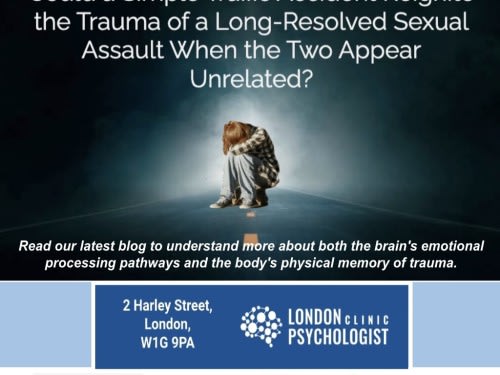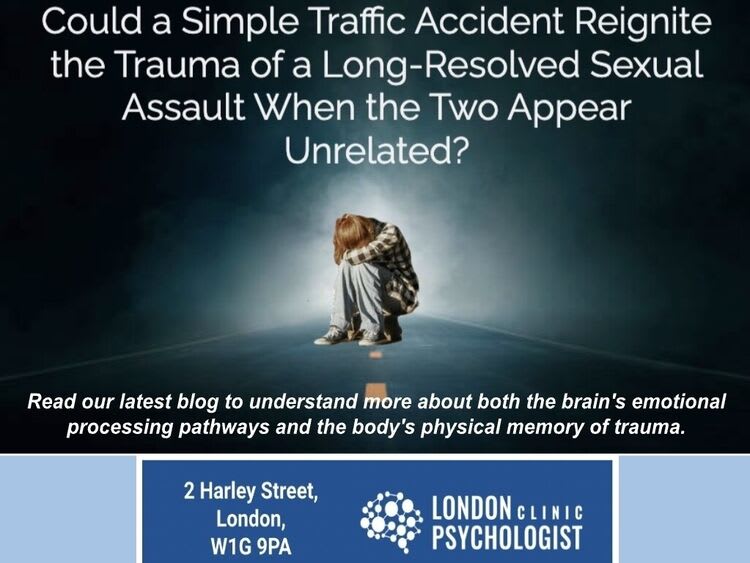Trauma Reactivation

posted 2nd October 2024
The Lingering Effects of Trauma and how the Body and Mind Hold On
Trauma, whether experienced as a single event or a series of prolonged stressors, can have lasting impacts on both the body and mind. The effects of trauma extend far beyond the initial experience, often resurfacing in unexpected ways and disrupting daily life. Psychological and physical symptoms, sometimes subtle and at other times overwhelming, can persist for years, leaving survivors to cope with an ongoing battle. This article explores how trauma manifests in the body and mind and why new, unrelated events—like a car accident—can reignite old traumatic memories, such as those from a past sexual assault.
Trauma affects the body as much as it does the mind. When someone experiences a traumatic event, their body responds by activating the fight-or-flight response, which is designed to protect them from danger. This survival mechanism releases stress hormones, such as cortisol and adrenaline, which prepare the body to respond. However, in cases of severe or prolonged trauma, the body can remain in a heightened state of arousal, even when the threat has passed.
According to research by trauma expert Dr. Bessel van der Kolk, trauma is often "stored in the body" as tension, pain, and other physical symptoms. This is particularly true for individuals who have experienced intense trauma, such as sexual assault or combat. Chronic pain, digestive problems, headaches, and even cardiovascular issues are common among trauma survivors. These symptoms can persist for years after the traumatic event, leading to a condition known as somatic symptom disorder.
Trauma and the Brain
Trauma also leaves its mark on the brain. When exposed to a traumatic event, the amygdala, the brain’s emotional center, becomes overactive, while the prefrontal cortex—responsible for logic and decision-making—loses functionality. This imbalance means that trauma survivors often remain hypervigilant, constantly scanning for danger even in safe environments. It can also interfere with the brain's ability to process memories, which is why traumatic memories can feel fragmented or incomplete.
Post-Traumatic Stress Disorder (PTSD) is one of the most well-known conditions arising from trauma. For those with PTSD, reminders of the traumatic event—known as triggers—can lead to flashbacks, panic attacks, or intrusive thoughts. These reminders can be specific, such as a sound or smell, or general, such as a stressful situation like a car accident. Even unrelated events can bring up the original trauma, as the brain struggles to differentiate between past and present threats.
Why a Car Accident Can Ignite an Old Trauma
Trauma is cumulative in nature, meaning that a new traumatic experience can reignite the emotional and physical responses tied to a previous trauma. For example, a car accident can serve as a trigger for someone who has previously experienced a sexual assault. This happens for several reasons:
1. Fight-or-Flight Activation: Both a car accident and sexual assault activate the body’s fight-or-flight response, leading to similar feelings of helplessness and fear. The brain, already sensitised by the first trauma, may react as if it is experiencing the original event again. This can lead to flashbacks or intrusive memories of the past assault.
2. Emotional and Sensory Overlap: Trauma is often remembered not only as an event but as a set of sensations—feelings of fear, being out of control, or even physical pain. In a car accident, these sensations can mirror those experienced during a sexual assault, triggering a reactivation of unresolved emotions from the past.
3. Body Memory: The body holds onto traumatic experiences in the form of muscle tension, pain, or other physical sensations. The impact of a car accident can "wake up" these dormant physical memories, causing the survivor to experience physical symptoms (e.g., tightness, nausea) that they associate with the previous trauma.
4. The Mental and Emotional Effects of Trauma
Beyond physical symptoms, trauma has significant psychological consequences. Depression, anxiety, and dissociation are common among trauma survivors. People often report feeling disconnected from themselves or their surroundings, a coping mechanism developed to manage the overwhelming emotions linked to their trauma.
Over time, trauma can affect relationships, work, and self-identity. Survivors may avoid situations that remind them of the trauma, become more isolated, or engage in unhealthy coping mechanisms, such as substance abuse. It’s crucial to recognise that trauma can deeply affect one’s sense of safety, control, and trust in the world. In summary, it is not debatable but clinically well-supported that a traumatic event, such as a traffic accident, can reignite unresolved trauma from a past sexual assault. This occurs through both the brain's emotional processing pathways and the body's physical memory of trauma.
Trauma has profound and lasting effects on both the body and mind. The reactivation of old trauma by new, seemingly unrelated events, such as a car accident, is a testament to how deeply trauma can shape an individual’s response to life. Understanding these effects is the first step toward healing, and with appropriate psychological interventions, individuals can work through their trauma and regain control over their lives. At the London Psychologist Clinic, we specialise in evidence-based treatments to help trauma survivors navigate their healing journey, ensuring that they do not have to face it alone.




